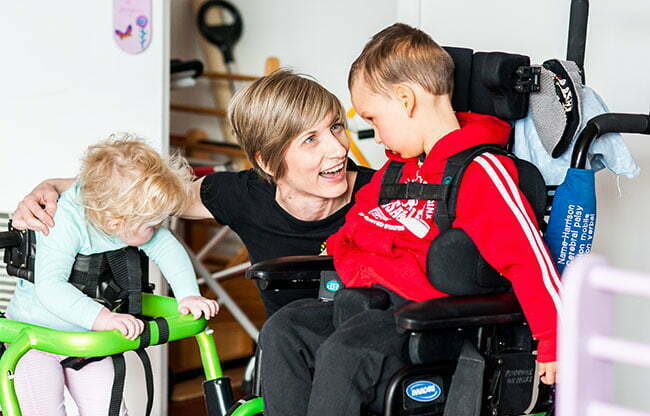

Conductive education is a complex education system for children and adults with neurological disorders such as Cerebral Palsy, Multiple Sclerosis, Spina Bifida, Parkinson’s and Stroke related disabilities, and acquired brain injuries. Dr Andras Peto developed conductive education in the 1950s in Hungary.
Conductive education focuses on the skills needed to become more independent. It combines medical knowledge and educational methods to enable individuals to learn (or re-learn) how to gain control of his/her motor functions. Although the neural pathways have been damaged, the nervous system possesses the capacity to form new neural connections and this can be facilitated through a suitably instructed teaching and learning process.

Using a typical age appropriate education / curriculum, or ‘motivation’, conductive education uses music, rhythm and repetition to ‘teach’ the individual each new skill, rather than direct manipulation. This way independence is reached on two levels.
Firstly, conductive education requires effort from the individual. Any improvement in ability comes only as a result of hard work. Therefore, it is a tremendous boost to self-confidence each time a goal is reached.
Secondly, by teaching someone how to sit, stand, walk with basic equipment, there is greater freedom. Conductive education recognises that whilst accessible environments should be promoted it is equally as important to teach individuals how to better adapt to their environment. It is not always possible to change an environment to suit a disability. As the old saying goes, if you give a man a fish, he eats for a day. If you teach a man to fish, he eats for a lifetime.
Conductive education also seeks to teach both children and families problem solving skills. As every individual is different, and every disability is different, unique and sometimes unconventional, ways of accomplishing motor tasks need to be found.

Conductive education was developed for people of all ages who have ‘motor disorders’, or movement control problems arising from an injury to the brain or another part of the central nervous system. These injuries can occur before, during or after birth, or as a result of an accident, disease or stroke later in life.
For conductive education to be most beneficial, the individual ideally be able to demonstrate basic cognitive skills and show signs of understanding (and following) verbal communication.

Conductive education is particularly valuable for children with Cerebral Palsy, Dyspraxia, Spina Bifida or ABI. By assisting the child to develop independence with activities of daily living or as identified in CE, an ortho-functioning personality, children may face less stigma or exclusion by others. Children are taught to see themselves as active and self-reliant participants in the world. The result of conductive education is that the quality of life is improved as well as the psychological well being of the child and their family.

For adults with Parkinson’s disease, Multiple Sclerosis, Paraplegia and after-stroke conditions, CE aims to regain motor control through creating new neural pathways; a bit like ‘gym for the brain’. People, who live with any of these conditions experience difficulties with coordinating and controlling their movements. Associated problems often include communication difficulties and sensory impairment.

Conductive education is not a traditional therapy, but rather a multi-disciplinary approach to develop the whole person physically, socially, cognitively and psychologically. It is a learning process and not a treatment or therapy. Conductive education teaches participants skills to meet the challenges of everyday life. They need to be active in this process, not just passively ‘receiving’, but more ‘working’ to achieve.
Click here for more information on the history of conductive education.
To learn more about how Future footprints can help you, contact us on 0400 202 509.


